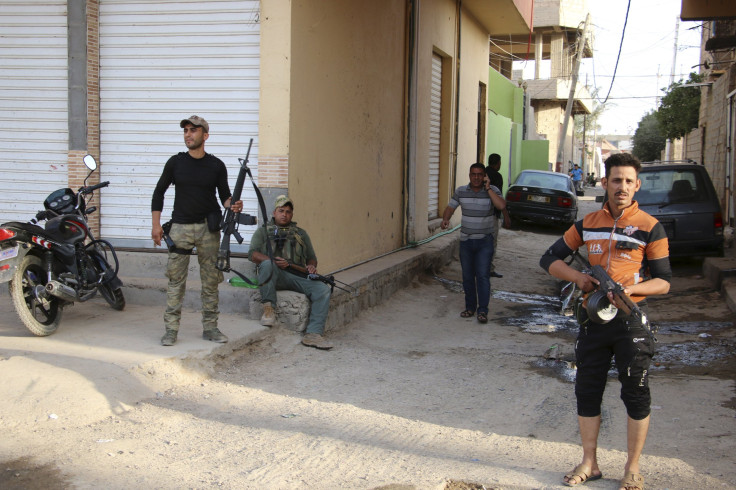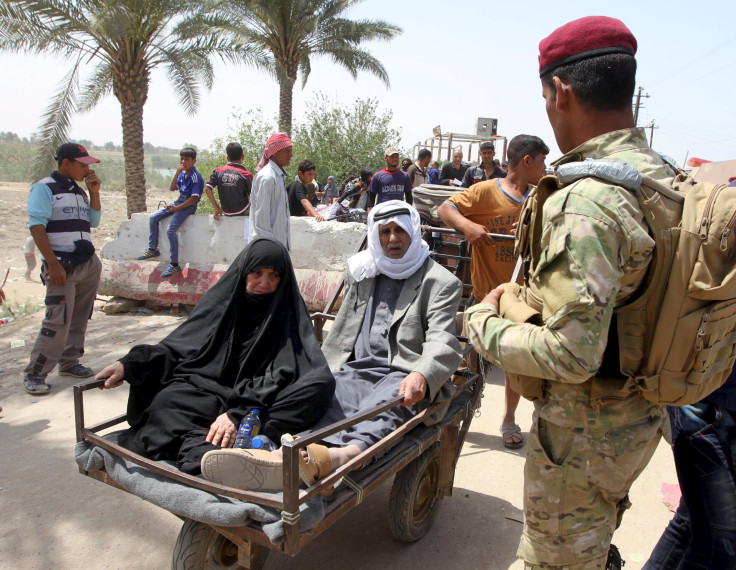Operation To Retake Ramadi Underway, But Soldiers Doubt New Iraqi, US Military Strategy

Iraqi security forces are in the midst of launching an offensive to retake the key western city of Ramadi in Anbar province, Sunni tribesmen said Tuesday. The battle will focus on gaining back the upper hand from the Islamic State group by pushing the militants out of the city and will implement a new strategy developed by U.S. military advisors over the last two months. But fighters say despite the changes in military strategy and new American weapons, the offensive could still fail to defeat the Sunni militant group because of widespread disagreements between Shiite and Sunni fighters.
The battle to retake Ramadi comes just seven weeks after the Islamic State group, also known as ISIS or ISIL, outgunned the Iraqi military and captured the city. The Sunni militant group had for months fought a limited number of Iraqi forces in Ramadi city, gaining ground and then falling back. Then, in May, IBTimes exclusively learned that prominent Sunni tribesmen, some of whom govern large swaths of land in Anbar province, helped ISIS take over Ramadi. The tribesmen ramped up their support for ISIS in the form of cash and weapons. The loss of Ramadi was a major blow to the Iraqi forces who had defeated the Sunni militant group in Tikrit a month earlier.
The coordination between the Sunni tribesmen and ISIS angered the Shiite forces who said then that they did not trust anyone else to take on the fight against ISIS in Anbar. That sentiment is still widespread in the Shiite militias, fighters say. Sunni tribesmen say they also do not trust the Shiite fighters. Those sectarian tensions have prevented Iraqi forces from winning more battles against ISIS, fighters say, and could prevent a victory in Ramadi.
Officials in Anbar province expressed conflicting ideas Tuesday in interviews with the International Business Times on the upcoming battle against ISIS in Ramadi. The Sunni tribes said they were leading the fight against the militant group, while Karim al-Nuri, the spokesman for the Shiite volunteer popular mobilization forces, said his faction would be the "commander and planner of the operations" in Ramadi.
“The Popular Mobilization Committee will not participate in the liberation of Ramadi,” said Sheikh Omar al-Alwani, a member of Anbar’s provincial council. “Most of the tribes do not trust them and they do not trust us."

The tensions between the Shiite and Sunni fighters forced the U.S. military advisors in the country to rethink its strategy in Anbar, an area that consists predominantly of Sunnis, in the wake of the Ramadi defeat. The Baghdad government and its American allies decided that it needed a new force, allied with the wealthy Sunni tribesmen that govern Anbar and provided the fighters with the heavy weapons needed to take on the disciplined, well-armed ISIS fighters. It began training Sunni volunteers in May at the Habbaniyah military base on the outskirts of Ramadi who would also be paid a salary of $800 a month.
The first phase of the battle to retake Ramadi has already begun, soldiers say, as the Shiite volunteer forces, known in Iraq as the Popular Mobilization Forces, attack militants in villages in Fallujah and Saqlawiyah, areas east of Ramadi that border the capital, Baghdad. The second phase of the operation will begin following the end of Ramadan next week. The Iraqi military plans to dispatch 6,000 Sunni fighters from Baghdad and Anbar province into Ramadi city and could increase the number of fighters to 10,000, soldiers told International Business Times.
The plan is supposed to help the Iraqi military realize its long-promised goal to retake the northern city of Mosul, whose fall to ISIS last year heralded the rise of the militant army. If successful in Ramadi, the Iraqi forces will push the Islamic State militants from the city north to Mosul, where the Sunni militant group runs its defacto headquarters in Iraq, consolidating its ranks and making it easier to attack.
Al-Nuri said Shiite fighters with the Badr Organization, one of the largest militias in the country and largely backed by Iran, will reinforce the outskirts of Ramadi to prevent the militants from escaping the area. They will continue to station themselves in Saqlawiyah and Fallujah.
Now, as they try and mobilize to retake lost ground, Sunni tribesmen in Anbar say they are not optimistic that the forces can work together efficiently, especially without more help from Baghdad.
"We could take back all of Anbar in six months if we had the weapons Baghdad promised," al-Alwani said.
There is also concern among U.S. and Iraqi military advisors that the effort to train a new class of Sunni fighters could fail, like a previous effort to train Sunnis did, earlier this year.
Using the blueprint of the “Sunni Awakening” strategy in 2007, when the U.S. funneled arms to Sunni tribes in western Iraq to fight al Qaeda, Washington has tried to replicate that model against ISIS. But that strategy is currently in tatters because the weapons the U.S. promised never made it into the hands of the tribes in Anbar, local leaders told IBTimes.
President Barak Obama said in a press conference Monday that the U.S. was speeding up its training of Iraqi forces, but that more could be done.
“This aspect of our strategy was moving too slowly, but the fall of Ramadi has galvanized the Iraqi government,” he said. “This will not be quick — this is a long-term campaign. It will take time to root [ISIS militants] out, and doing so must be the job of local forces on the ground, with training and air support from our coalition.”
© Copyright IBTimes 2025. All rights reserved.





















